DAY 2: 25 July (Wed)
9:00-10:45 Plenary Session 3
Climate Change: The Way Forward for Climate Regime after Durban
Room 503 / P-3
 Prominent figures will discuss the outcomes of the United Nations Framework Convention on Climate Change (UNFCCC) 17th Conference of the Parties (COP17) in Durban and the issues beyond. Focus will be on two key issues: how to increase the ambition level of mitigation efforts to hold the global average temperature rise below 2 degrees Celsius; and how to address the issue of equity and common but differentiated responsibility and respective capability (CBDR/RC).
Prominent figures will discuss the outcomes of the United Nations Framework Convention on Climate Change (UNFCCC) 17th Conference of the Parties (COP17) in Durban and the issues beyond. Focus will be on two key issues: how to increase the ambition level of mitigation efforts to hold the global average temperature rise below 2 degrees Celsius; and how to address the issue of equity and common but differentiated responsibility and respective capability (CBDR/RC).Moderator
- Prof. Akio Morishima, Chair of the Board of Directors, Japan Climate Policy Center
Keynote Speakers
- Dr. Young-Woo Park,Regional Director & Representative for Asia and the Pacific, United Nations Environment Programme, Regional Office for Asia & the Pacific (UNEP-ROAP) PDF(1.0MB)
- Mr. Tom Athanasiou,Executive Director, EcoEquity PDF(761KB)
Discussant
- Prof. Katsunori Suzuki, Director & Professor, Environment Preservation Center, Kanazawa University PDF(948KB)
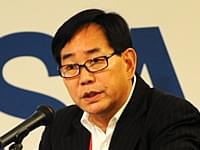
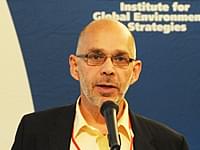
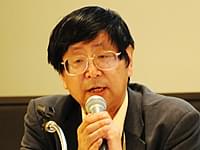
11:00-12:30 Parallel Sessions
Domestic Climate Actions after Durban
Room 503 / S3-1
This session gives an update on domestic climate actions in major economies and discusses how each country can contribute to collective action toward achieving the 2 degrees Celsius target. Experts from China, India, Indonesia, Japan and Germany are invited to provide their insights.
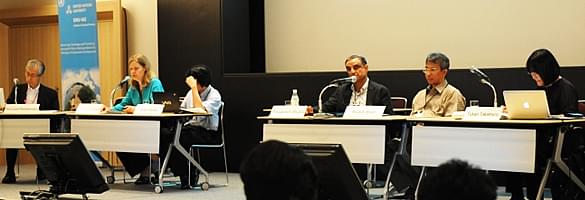
Moderator
- Prof. Hironori Hamanaka, Chair of the Board of Directors, IGES
Panellists
- Prof. Dr. Miranda A. SchreursDirector of the Environmental Policy Research Institute, The Freie Universität Berlin PDF(253KB)
- Prof. Yukari TakamuraProfessor, Graduate School of Environmental Studies, Nagoya University PDF(2.3MB)
- Prof. Priyadarshi Shukla,Professor, Public System Group, Indian Institute of Management, Ahmedabad PDF(810KB)
- Prof. Rizaldi Boer,Executive Director, Centre for Climate Risk and Opportunity Management in Southeast Asia and Pacific, Bogor Agriculture University, Indonesia PDF(393KB)
- Prof. Jusen Asuka,Director, Climate Change Group, IGES / Professor, Center for Northeast Asian Studies, Tohoku University PDF(323KB)
Development of Smart Communities in Asian Cities
Room 502 / S3-2
This session introduces a smart community developed in the Higashida area of Kitakyushu City, Japan and the city’s approaches in extending support to develop similar models in Surabaya, Indonesia and Putrajaya, Malaysia in cooperation with the Government of Japan. This session discusses the constraints and challenges in disseminating similar approaches in terms of legal, institutional and technical aspects with a focus on links with the national grid, and the potential of a city-to-city cooperation modality to promote these activities.
- Outline PDF(153KB)
- Outline PDF(153KB)
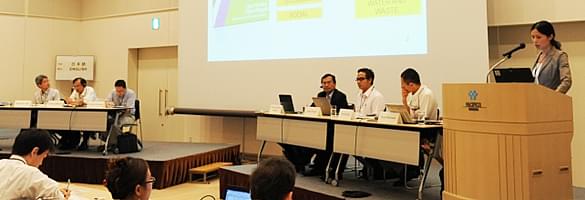
Moderators
- Mr. Toshizo Maeda, Acting Director, IGES Kitakyushu Urban Centre
- Ms. Ikuyo Kikusawa, Policy Researcher, IGES Kitakyushu Urban Centre PDF(1.0MB)
Panellists
- Mr. Mohd. Rosli Abdullah,Senior Under Secretary, Green Technology Sector, Ministry of Energy, Green Technology and Water, Government of Malaysia PDF(1.7MB)
- Mr. Gingin Ginanjar,Landscaping Section, Landscaping and Common Street Lighting Division, Cleanliness and Landscaping Surabaya City Council, Indonesia PDF(7.1MB)
- Mr. Yoshinori Furukawa,Director, Smart Community Department, New Energy and Industrial Technology Development Organization (NEDO), Japan PDF(529KB)
- Mr. Toshikazu Matsuoka,Chief Executive (Future City), Environment Bureau, City of Kitakyushu PDF(398KB)
- Mr. Motoshi Muraoka,Partner, Senior Executive Manager, Socio & Eco Strategic Consulting Sector, NTT Data Institute of Management Consulting, Inc. PDF(465KB)
Financial Innovations for Resilience: From the Tsunami in Tohoku to Climate Change in Bangladesh and Beyond
Room 411+412 /
S3-3
S3-3
This session will discuss the creation and delivery of innovative financial services, such as microfinance, to build resilience to natural disasters. Lessons will be drawn from the experiences of Asian developing countries as well as Japan. Global damage caused by natural disasters continues to increase rapidly, mainly driven by climate change. The rural poor in developing countries are particularly vulnerable to such disasters. However, as the tsunami and earthquake of March 2011 in east Japan reminded us, even technologically advanced countries are vulnerable to natural disasters, and the concept of resilience is equally as important for them as it is for developing countries.
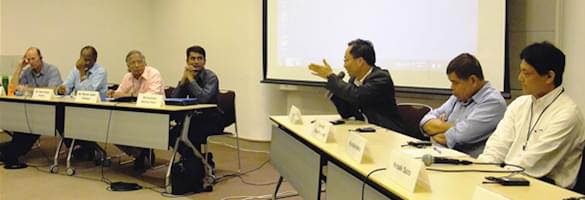
Moderators
- Dr. Henry Scheyvens,Director, Natural Resources Management Group, IGES PDF(322KB)
- Dr. Shinano Hayashi,Deputy Director, Natural Resources Management Group, IGES
Speakers
- Dr. Mohammad Mahfuz Kabir,Senior Research Fellow, Bangladesh Institute of International and Strategic Studies (BIISS)
- Dr. Somsak Boromthanarat,Director, Asian Coastal Resources Institute Foundation (CORIN-Asia) PDF(466KB)
- Mr. Kyosuke Inada,Deputy Head and Advisor, Office for Climate Change, Global Environment Department, Japan International Cooperation Agency (JICA) PDF(1.3MB)
- Mr. Hiroaki Saito,CEO, iLink, Inc. (Sanriku Oysters Reconstruction Project) PDF(1.0MB)
Panellists
- Prof. Qian Ye,Executive Director, International Project Office, Integrated Risk Governance Project (IRGP/IHDP), Beijing Normal University PDF(335KB)
- Dr. Md. Mosleh Uddin Sadeque,Interim Executive Director, Institute of Microfinance (InM)
- Dr. Md. Abdul Baqui Khalily,Professor, Department of Finance, University of Dhaka
12:40-14:05 Lunch Session
IGES White Paper IV “Greening Governance in Asia-Pacific”
Room 502 / L-2
The Fourth IGES White Paper, entitled "Greening Governance in Asia-Pacific", offers recommendations for governance arrangements and policy solutions that are critical to accelerate the transition to a green economy, as without significant reform in the region global sustainable development will remain an under-implemented ideal rather than a new reality. During this official launch contributing authors will share their research results and discuss with the audience the institutional arrangements needed for regional sustainable development.
Related Link
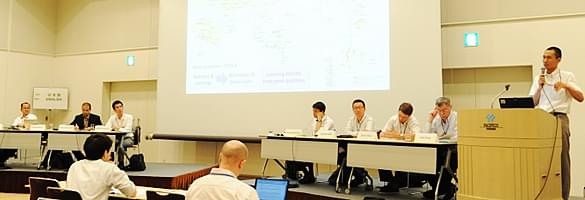
Moderator
- Dr. Peter King, Senior Policy Advisor, IGES Regional Centre, Bangkok
Speakers
- Mr. Hideyuki Mori, President, IGES
- Mr. Simon Olsen, Researcher, Governance and Capacity Group, IGES
- Dr. Yasuhiko Hotta, Deputy Director, Sustainable Consumption and Production Group, IGES PDF(239KB)
- Dr. Enrique Ibarra Gene, Policy Researcher, Natural Resources Management Group, IGES
- Mr. Kazuhisa Koakutsu, Deputy Director, Market Mechanism Group, IGES PDF(63KB)
- Dr. Abdessalem Rabhi, Policy Researcher, IGES Kansai Research Centre PDF(78KB)
- Mr. Toshizo Maeda, Acting Director, IGES Kitakyushu Urban Centre PDF(1.5MB)
- Mr. Masanori Kobayashi, Associate Professor, Yokohama National University Graduate School of Environment and Information Sciences
14:15-15:45 Plenary Session 4
Rio+20 Follow up
Room 503 / P-4
 Rio+20 held in June 2012 has promoted discussion on sustainable development in the 21st century context, and revitalised global commitments. Outcomes on green economy, institutional framework for sustainable development, framework for action and follow-up, means of implementation have numerous implications for sustainable development governance at all levels (global, regional, national and local). This session will have a view on how sustainable development governance would be strengthened at the global level, and discuss what kind of implications such a global movement will bring to Asia and the Pacific, particularly in terms of strengthening regional governance for sustainable development, and overall economies and social development.
Rio+20 held in June 2012 has promoted discussion on sustainable development in the 21st century context, and revitalised global commitments. Outcomes on green economy, institutional framework for sustainable development, framework for action and follow-up, means of implementation have numerous implications for sustainable development governance at all levels (global, regional, national and local). This session will have a view on how sustainable development governance would be strengthened at the global level, and discuss what kind of implications such a global movement will bring to Asia and the Pacific, particularly in terms of strengthening regional governance for sustainable development, and overall economies and social development.Moderator
- Prof. Ryokichi Hirono, Professor Emeritus, Seikei University
Keynote Speakers
- Mr. Rae Kwon Chung,Director, Environment and Development Division, United Nations Economic and Social Commission for Asia and the Pacific (UNESCAP) PDF(338KB)
- Prof. Nay Htun,Professor, State University of New York, Stony Brook PDF(170KB)
Discussant
- Mr. Surendra Shrestha,Director & Focal Point for Sustainable Development Goals (SDGs) at Rio+20 Secretariat
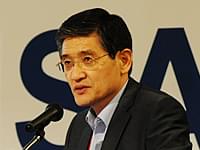
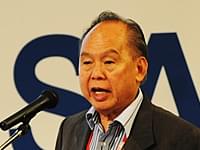
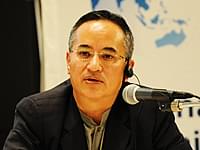
16:00-17:30 Parallel Sessions
Future Directions for IFSD: Post Rio+20
Room 503 / S4-1
Several processes related to IFSD were set in motion at Rio+20, including creating a High Level Political Forum for Sustainable Development to replace the Commission on Sustainable Development(CSD), strengthening the United Nations Environment Programme, and a process to determine the functions of a High Level Representative for Future Generations. To ensure that these processes can deliver, actions at the global intergovernmental levels, is not enough, actions at regional, national and local levels are also necessary, as well as in sectors and by actors not traditionally associated with the sustainability agenda. Contributing to the idea of ‘bringing the Rio+20 outcomes home’, this session will emphasise implications in Asia and discuss which institutional changes are needed at regional, national and local levels, as well as how to integrate different economic sectors.
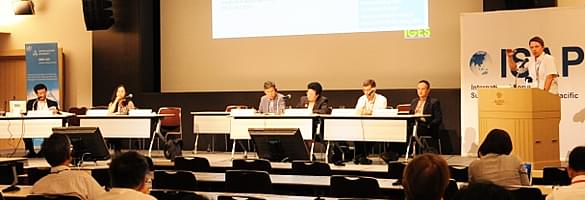
Moderator
- Mr. Kazuhiko Takemoto, Senior Advisor to Minister of the Environment / Senior Fellow, Head of the Education, Sustainability and Ecosystem Assessment Programme, UNU-IAS
Speakers
- Ms. Tomoko Nishimoto,Director, Division of Regional Cooperation (DRC), United Nations Environment Programme (UNEP)
- Dr. Hoi-seong Jeong, President Emeritus, Korea Environmental Policy and Administration Society PDF(509KB)
- Dr. Monthip Sriratana Tabucanon, Senior Adviser, Senate Commission on Natural Resources and Environment, Office of the Parliament, Thailand PDF(2.8MB)
- Dr. Mark Elder, Director,Governance and Capacity Group, IGES PDF(475KB)
- Mr. Simon Olsen,Researcher, Governance and Capacity Group, IGES PDF(58KB)
Good Practices and Lessons Learned from Measurement, Reporting and Verification (MRV) of Mitigation Actions towards the Low Carbon Development in Asia
Room 502 / S4-2
MRV (Measurement, Reporting, and Verification) of greenhouse gases (GHG) is essential to establish a low-carbon society. This session will discuss options and issues related to methodological and institutional frameworks for MRV of GHG emissions as well as emissions reduction, based on good practices and lessons learned from both developed and developing countries. It will explore how to establish effective methodologies and implementing institutions in Asia in the post-2012 climate regime from technical and political aspect.
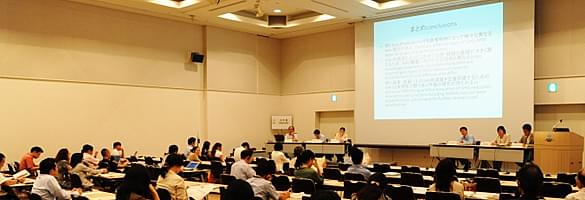
Moderator
- Mr. Taka Hiraishi, Senior Consultant, IGES (IPCC Inventories Programme Co-chair)
Keynote Speaker
- Mr. Rae Kwon Chung,Director, Environment and Development Division, United Nations Economic and Social Commission for Asia and the Pacific (UNESCAP) PDF(456KB)
Speakers
- Ms. Mayumi Ishii,CSR and Environmental Management Division, LIXIL Corporation PDF(559KB)
- Dr. Pongvipa Lohsomboon,Director of Carbon Business Office, Thailand Greenhouse Gas Mangement Organisation (TGO) PDF(692KB)
- Dr. Yasushi Ninomiya,Director, Market Mechanism Group, IGES PDF(123KB)
- Mr. Kazuhisa Koakutsu,Deputy Director, Market Mechanism Group, IGES PDF(104KB)
Knowledge Management and Community of Practice for Sustainable Development
Room 411+412 /
S4-3
S4-3
The session will discuss how a community of practice can evolve and facilitate knowledge management and agenda setting for sustainable development and aim to identify key elements for the successful conduct of a community of practice. How can information and knowledge be shared and managed among a number of practitioners in promoting sustainable development? Are there any key elements for success?
- Introduction: Ms. Jihyun Kim, IGES Regional Centre, Bangkok PDF(1.7MB)
- A quick in-room survey on community of practice with audience PDF(646KB)
- Introduction: Ms. Jihyun Kim, IGES Regional Centre, Bangkok PDF(1.7MB)
- A quick in-room survey on community of practice with audience PDF(646KB)
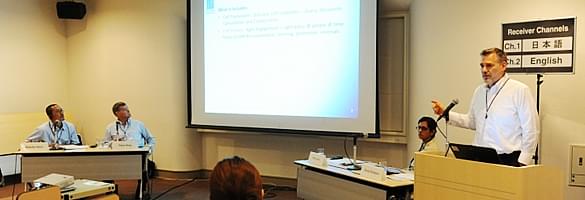
Moderator
- Dr. Daisuke Sano, Director, IGES Regional Centre, Bangkok
Speakers
- Mr. David Galipeau,Knowledge and Innovation Management Practice Leader, UNDP Asia Pacific Regional Centre, Bangkok PDF(750KB)
- Ms. Hina Lotia,Regional Coordinator, Asia, Climate & Development Knowledge Network (CDKN) / General Manager, Programme Development Department, LEAD Pakistan PDF(1.3MB)
Panellist
- Dr. Peter King,Senior Policy Advisor, IGES Regional Centre, Bangkok
17:30-17:45 Closing Session
Room 503
Of the thirteen posters presented, three posters were awarded by the poster selection committee.




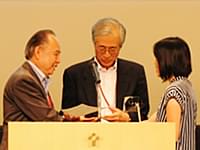

(11:00-12:30 Workshop)
Governance Challenges for Greening the Urban Economy:
Co-Benefits and Beyond
Co-Benefits and Beyond
UNU-IAS, 6F, International Organization Center
Cities play a crucial role in facing the challenges to create a greener economy and the institutional framework for sustainable development. This session will discuss the concept of green economy in an urban context through the lenses of two recent publications released by IGES and UNU-IAS. One is a UNU-IAS policy paper on how to create the mechanisms for moving urban areas towards a greener economy. The other is an IGES edited book on low carbon transportation in Asia.
Related Link
Moderator
- Mr. Sumihiro Kuyama,Japan Habitat Association / UN Association of Japan / Former UN Assistant Secretary-General (Under-Secretary-General for UN Habitat)
Speakers
- Dr. Jose A. Puppim de Oliveira,Assistant Director & Senior Research Fellow, United Nations University Institute of Advanced Studies (UNU-IAS)
- Dr. Eric Zusman,Senior Policy Researcher, Climate Change Group, IGES
Discussant
- Prof. Darko Radovic,Professor, Keio University



 Go to top of page
Go to top of page